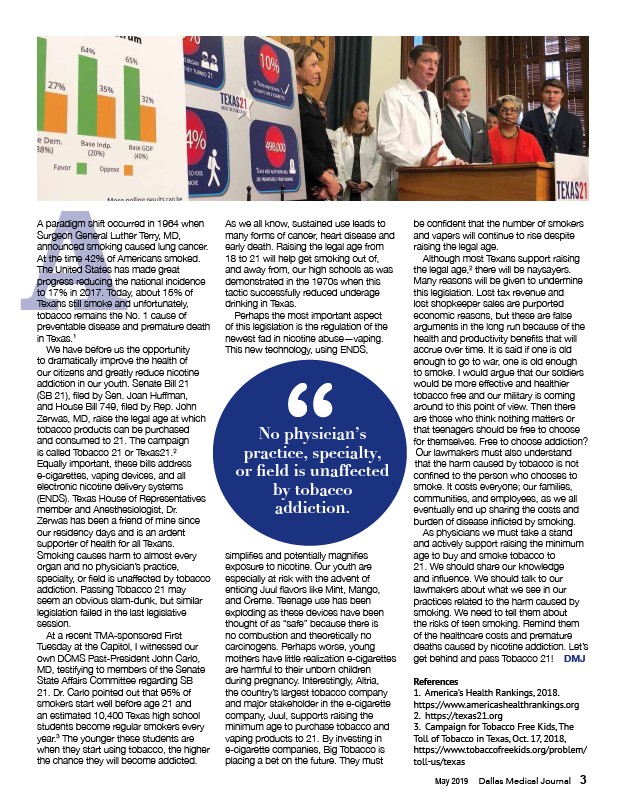
May 2019 Dallas Medical Journal 3
AA paradigm shift occurred in 1964 when
Surgeon General Luther Terry, MD,
announced smoking caused lung cancer.
At the time 42% of Americans smoked.
The United States has made great
progress reducing the national incidence
to 17% in 2017. Today, about 15% of
Texans still smoke and unfortunately,
tobacco remains the No. 1 cause of
preventable disease and premature death
in Texas.1
We have before us the opportunity
to dramatically improve the health of
our citizens and greatly reduce nicotine
addiction in our youth. Senate Bill 21
(SB 21), filed by Sen. Joan Huffman,
and House Bill 749, filed by Rep. John
Zerwas, MD, raise the legal age at which
tobacco products can be purchased
and consumed to 21. The campaign
is called Tobacco 21 or Texas21.2
Equally important, these bills address
e-cigarettes, vaping devices, and all
electronic nicotine delivery systems
(ENDS). Texas House of Representatives
member and Anesthesiologist, Dr.
Zerwas has been a friend of mine since
our residency days and is an ardent
supporter of health for all Texans.
Smoking causes harm to almost every
organ and no physician’s practice,
specialty, or field is unaffected by tobacco
addiction. Passing Tobacco 21 may
seem an obvious slam-dunk, but similar
legislation failed in the last legislative
session.
At a recent TMA-sponsored First
Tuesday at the Capitol, I witnessed our
own DCMS Past-President John Carlo,
MD, testifying to members of the Senate
State Affairs Committee regarding SB
21. Dr. Carlo pointed out that 95% of
smokers start well before age 21 and
an estimated 10,400 Texas high school
students become regular smokers every
year.3 The younger these students are
when they start using tobacco, the higher
the chance they will become addicted.
As we all know, sustained use leads to
many forms of cancer, heart disease and
early death. Raising the legal age from
18 to 21 will help get smoking out of,
and away from, our high schools as was
demonstrated in the 1970s when this
tactic successfully reduced underage
drinking in Texas.
Perhaps the most important aspect
of this legislation is the regulation of the
newest fad in nicotine abuse—vaping.
This new technology, using ENDS,
“
simplifies and potentially magnifies
exposure to nicotine. Our youth are
especially at risk with the advent of
enticing Juul flavors like Mint, Mango,
and Creme. Teenage use has been
exploding as these devices have been
thought of as “safe” because there is
no combustion and theoretically no
carcinogens. Perhaps worse, young
mothers have little realization e-cigarettes
are harmful to their unborn children
during pregnancy. Interestingly, Altria,
the country’s largest tobacco company
and major stakeholder in the e-cigarette
company, Juul, supports raising the
minimum age to purchase tobacco and
vaping products to 21. By investing in
e-cigarette companies, Big Tobacco is
placing a bet on the future. They must
be confident that the number of smokers
and vapers will continue to rise despite
raising the legal age.
Although most Texans support raising
the legal age,2 there will be naysayers.
Many reasons will be given to undermine
this legislation. Lost tax revenue and
lost shopkeeper sales are purported
economic reasons, but these are false
arguments in the long run because of the
health and productivity benefits that will
accrue over time. It is said if one is old
enough to go to war, one is old enough
to smoke. I would argue that our soldiers
would be more effective and healthier
tobacco free and our military is coming
around to this point of view. Then there
are those who think nothing matters or
that teenagers should be free to choose
for themselves. Free to choose addiction?
Our lawmakers must also understand
that the harm caused by tobacco is not
confined to the person who chooses to
smoke. It costs everyone; our families,
communities, and employees, as we all
eventually end up sharing the costs and
burden of disease inflicted by smoking.
As physicians we must take a stand
and actively support raising the minimum
age to buy and smoke tobacco to
21. We should share our knowledge
and influence. We should talk to our
lawmakers about what we see in our
practices related to the harm caused by
smoking. We need to tell them about
the risks of teen smoking. Remind them
of the healthcare costs and premature
deaths caused by nicotine addiction. Let’s
get behind and pass Tobacco 21! DMJ
References
1. America’s Health Rankings, 2018.
https://www.americashealthrankings.org
2. https://texas21.org
3. Campaign for Tobacco Free Kids, The
Toll of Tobacco in Texas, Oct. 17, 2018,
https://www.tobaccofreekids.org/problem/
toll-us/texas
No physician’s
practice, specialty,
or field is unaffected
by tobacco
addiction.